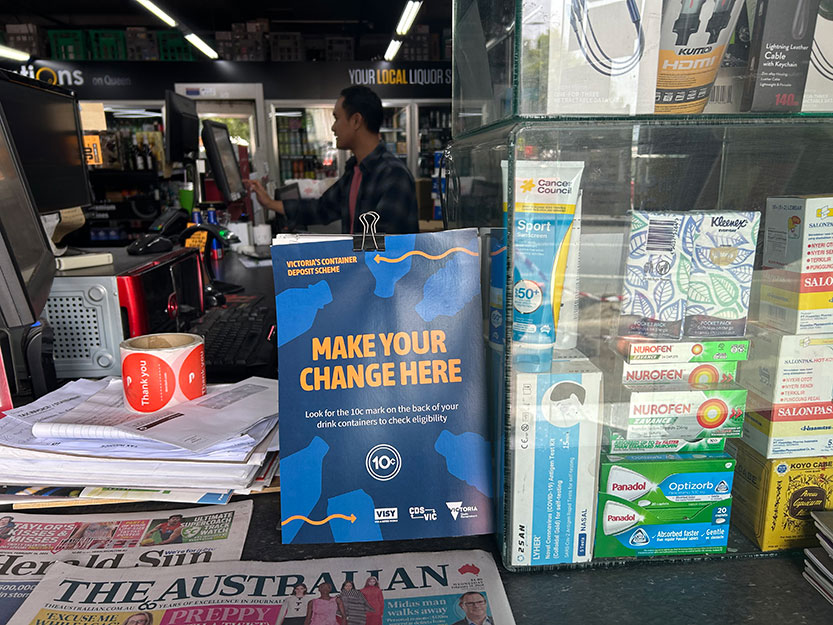Liquor shop faces huge demand under state’s container deposit scheme
A liquor shop acting as the only CBD site where people can cash in bottles and cans under the state’s container deposit scheme (CDS) is struggling to cope with demand.
Cellarbrations on Queen St is a registered over-the-counter site that issues 10-cent refunds for each drink container made of steel, aluminium, glass, plastic and cardboard.
It is part of the CDS, which was launched by the state government last November in a bid to transform Victoria’s waste and recycling system.
However, the small Cellarbrations store has faced a surge in customer refunds, with its capacity of storing collections being stretched to its limits.
When CBD News visited the shop in the middle of February, there were multiple bags of drinks containers piled at the back of the store.

A staff member at Cellarbrations said that their collection bin sometimes filled up in “one to two hours”, after which the store had to find alternative storage for the items.
According to the staff member, this was because the store did not want to turn customers away, with collection trucks only doing pick-ups on Tuesdays and Fridays.
The Visy-operated collection point services the entire CBD, which, according to the most recent 2021 census has a population of more than 43,000.
Residents need to trek to a depot in Thistlewaite St, South Melbourne for their next nearest collection point or hand their items over the counter at the Carlton Supermarket in Lygon St.
Refund points take the form of reverse vending machines, over-the-counter services, and depots.
Asked if there were plans to open more collection points in the city, Visy’s CDS general manager Tim O’Donnell, said, “We’re always looking to add more refund points to make the scheme even more accessible and convenient”.
If you’re a local business or community group and would like to sign up as a refund point, please get in touch.
Academics such as RMIT University’s Professor Usha Iyer-Raniga, who specialises in sustainable built environments, said that while the “idea is good”, more work needed to be done to fix teething problems in the system.
“If the process is not robust, people are going to be disincentivised,” she told CBD News.
She cited situations where the hours were incorrectly listed on the scheme’s website, and when collection points were not open, “people don’t take it seriously”.
But Prof. Iyer-Raniga did acknowledge the CDS helped to ensure that “the principles of circular economy are met”, referring to eliminating pollution and waste by closing loops, and allowing the planet to regenerate.
Dr Bhavna Middha, a Research Fellow from RMIT University focusing on waste minimisation and management, said that while the scheme was a great initiative for recycling and reuse, it was “still finding its feet in Victoria for product stewardship by companies that produce these containers”.
She said that the scheme was “not widely advertised” and described it as a “cumbersome process”, that needed to have return stations in more convenient locations, such as supermarkets and apartments.
Dr Middha also suggested that, unlike other countries, there is “not a great incentive” to deposit containers.
According to Bloomberg, countries such as Germany return €0.25 (A$0.41) for single-use plastics and cans.
Dr Middha also described an “equity issue” with the scheme, where older people or those with mobility issues might have difficulties accessing refunds.
She also said it was less accessible for individuals who did not have the space to store old containers, or who might have difficulties transporting containers to refund points and emphasised the need to improve the current system.
“If it doesn’t happen the right way, where people’s daily routines are taken into consideration, it will only be taken up by a few groups who are capable of accessing it, leading to low rates of return,” she said. •

Council endorses office tower at Flinders Lane despite querying car park demolition



 Download the Latest Edition
Download the Latest Edition